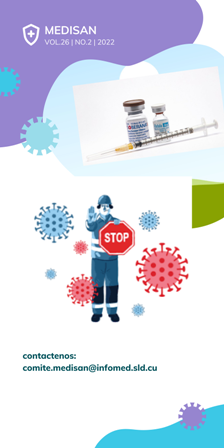GeneXpert as diagnostic method of tuberculosis in Santiago de Cuba
Keywords:
genexpert, lung tuberculosis, Mycobacterium tuberculosis, molecular diagnosis.Abstract
Introduction: Tuberculosis is a health problem worldwide, reason why methods as the GeneXpert are needed to carry out a quick and safe diagnosis.
Objective: To determine the accuracy of GeneXpert as a method for the diagnosis of tuberculosis in Santiago de Cuba in connection with the traditional studies.
Methods: A descriptive and cross-sectional study was carried out from December, 2018 to the same month in 2019 of 31 patients to whom the 3 methods for the diagnosis of tuberculosis were carried out. Some variables were used, such as age, sex, studied samples, positivity of the used methods, as well as consistency between the GeneXpert and the culture by means of the Kappa index.
Results: In the series there was a prevalence of the patients over 50 years (48.4 %), male sex (66.7 %) and sputum as more representative sample (80.6 %); also, the culture was positive in 32.3 % and GeneXpert in 22.6 %. As long as, tuberculosis was diagnosed in 11 patients and the Kappa index was 0.58.
Conclusions: The determination of GeneXpert in the diagnosis of tuberculosis is necessary, given its high sensibility and specificity in connection with the traditional studies of sputum and culture, which was confirmed due to the high consistency of the Kappa index.
Downloads
References
2. Alvis Zakzuk NJ, Carrasquilla MA, Jhajaira Gómez V, Robledo J, Alvis Guzmán NR, Hernández JM. Precisión diagnóstica de tres pruebas moleculares para detectar la tuberculosis multirresistente. Biomédica. 2017 [citado 04/03/2020]; 37:397-407. Disponible en: https://revistabiomedica.org/index.php/biomedica/article/view/3437/3618
3. Peñata A, Salazar R, Castaño T, Bustamente, Ospina S. Diagnóstico molecular de tuberculosis extrapulmonar y sensibilidad a rifampicina con un método automatizado en tiempo real. Biomédica. 2016 [citado 28/02/2020]; 36(Supl.1):78-89. Disponible en: https://revistabiomedica.org/index.php/biomedica/article/view/3088
4. Loredo Torres J, Albinez Pérez J, Colunche Narvaez C, CornejoPortella J. GeneXpert como método diagnóstico de tuberculosis pulmonar en una paciente con VIH y lupus eritematoso sistémico: reporte de caso. Rev Méd Trujillo. 2019 [citado 28/02/ 2020]; 14(2):99-104. Disponible en: https://revistas.unitru.edu.pe/index.php/RMT/article/view/2393
5. Toledano Grave de Peralta Y, Lafargue Mayoz D, Montero Migota M, Curí Quevedo S, Campos Muñoz M. Tuberculosis: tendencia, pronóstico y factores de riesgo afines en la provincia de Santiago de Cuba (2004-2014). Medisan (Santiago de Cuba). 2016 [citado 03/03/2020]; 20(4):452. Disponible http://scielo.sld.cu/scielo.php?script=sci_arttext&pid=S1029-30192016000400005
6. Zamboni Berra T, Inomata Bruce AT, Mathias Alves Y, Vieira Ramos AC, Giacomet CL, Arcéncio RA. Impacto de la prueba rápida molecular GeneXpert ® MTB/RIF en la detección de tuberculosis: tendencias temporales y territorios vulnerables. Rev Latin Am Enfermagem. 2021 [citado 01/02/2022]; 29. Disponible en: http://dx.doi.org/10.1590/1518-8345.441 2.3441
7. Rendón LA., Rendón Medina RA., Gómez Villareal JP. Tuberculosis y otras micobacterias. En: González F. Diagnóstico y tratamiento en neumología. 2da ed. México: Editorial el Manual Moderno; 2016. p. 198-208.
8. ONUSIDA. Hoja informativa. Últimas estadísticas sobre el estado de la epidemia de sida. 2020. [citado 21/06/2020]. Disponible en: https://www.unaids.org/es/resources/fact-sheet
9. Amaya G, Contrera M, Arrieta F, Montano A. Rendimiento del GeneXpert en el diagnóstico de tuberculosis pulmonar y extrapulmonar en la edad pediátrica. Arch. Pediatr. Urug. 2020 [citado 1 Feb 2022]; 91(supl.2). Disponible en: http://www.scielo.edu.uy/scielo.php?pid=S1688-12492020000800012&script=sci_arttext
10. Cuba. Ministerio de Salud Pública. Dirección de registros Médicos y Estadísticos de Salud. Morbilidad. Anuario Estadístico de Salud. 2018. La Habana: MINSAP; 2019.
11. Borraz Noriega D, Robledo Pascual JC, Torres Pérez JA, Flores Barrientos OI. Utilidad de la prueba de detección de ácidos nucleicos GeneXpert tuberculosis (MTB/RIF) en muestras respiratorias y no respiratorias en un hospital de referencia. Med Inter Méx. 2018 [citado 28/02/2020]; 34(3):381-7. Disponible en: http://www.scielo.org.mx/scielo.php?script=sci_arttext&pid=S0186-48662018000300005
12. Cortés Reyes E, Rubio Romero JA, Gaitán Duarte H. Métodos estadísticos de evaluación de la concordancia y la reproducibilidad de pruebas diagnósticas. Rev Colombiana Obstet Ginecol. 2010 [citado 12 /07/2020]; 61(3):247-55. Disponible en: http://www.scielo.org.co/scielo.php?script=sci_arttext&pid=S0034-74342010000300009&lng=en&nrm=iso&tlng=es
13. Díaz Dilernia F, Fresneda MJ, Deré JJ, Zicaro JP, Costa Paz M, Heraldo Yacuzzi C. Clasificación de las lesiones meniscales de ISAKOS: estudio de probabilidad intra e interobservador. Rev Asoc Argent Traumatol Deport. 2016 [citado 1707/2020]; 23 (1). Disponible en: https://g-se.com/clasificacion-de-lesiones-meniscales-de-isakos-estudio-de-reproducibilidad-intra-e-interobservador-2228-sa-I5885393fcd4dc
14. García P, Balcells ME, Castillo C, Miranda C, Geoffroy E, Román JC, Wozniak A. Evaluación de la técnicaXpert® MTB/RIF para la detección de Mycobacterium tuberculosis complex en muestras extra-pulmonares. Rev Chil Infectol. 2017 [citado 28/02/2020]; 34(4):333-9. Disponible en: https://www.scielo.cl/scielo.php?script=sci_arttext&pid=S0716-10182017000400333
15. Mederos Cuervo LM, Martínez Romero MR, Sardiñas Aragón M, García León G, Chilemo Tunyth S, Díaz Rodríguez R. Importancia diagnóstica del GeneXpert Mtb–Rif en pacientes infectados por el virus de inmunodeficiencia humana (VIH). AVFT. 2018 [citado 01/02/2022]; 37(4):355-9. Disponible en: https://www.revistaavft.com/images/revistas/2018/avft_4_2018/8_importancia_diagnostica_del_genexpert.pdf
Published
How to Cite
Issue
Section
License
All the articles can be downloaded or read for free. The journal does not charge any amount of money to the authors for the reception, edition or the publication of the articles, making the whole process completely free. Medisan has no embargo period and it is published under the license of Creative Commons, International Non Commercial Recognition 4.0, which authorizes the copy, reproduction and the total or partial distribution of the articles in any format or platform, with the conditions of citing the source of information and not to be used for profitable purposes.





